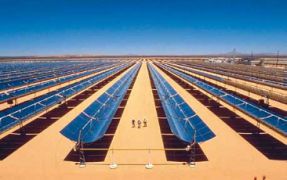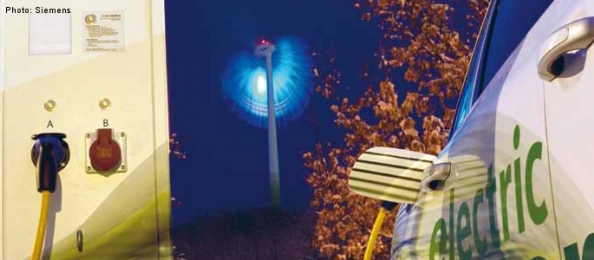The Future of Cities
Since cities will determine how a majority of the world’s population will live in the future, sustainable and innovative urban development is a must. The good news? Many solutions are already available. Over half the world’s population now lives in cities and by 2050 this share will climb to 70 percent. Cities emit 80 percent of all greenhouse gases and use 75 percent of all energy. We must address the urgent challenges of a growing population, soaring energy demands, and climate change. Technology and financing models will play a key role.
Green energy for green cities
May 17, 2010: In the Bavarian town of Irsching, the 847 MW Irsching 5 combined-cycle power plant began operation – at nearly 60 percent efficiency. This saves 40,000 tons of CO2 a year compared to a conventional plant. Technologies like these, such as carbon capture and storage systems being developed for cleaner coal-fired power plants, will meet future needs. Since coal will be essential for satisfying growing energy demands in the immediate future, it should be eco-friendly.
Add to that renewable energy sources such as solar, wind, and water. The world’s biggest offshore wind farm – Horns Rev II in the North Sea off Denmark – delivers up to 210 MW to supply 200,000 households. Yet renewable energy sources are often located far from cities. New high-voltage, direct-current (HVDC) transmission lines are needed to move green electricity efficiently and in an environmentally sound manner over great distances.
This technology is already reality in China, where 5,000 MW flow 1,400 km from hydro power plants to the megacities on the Pearl River Delta – with up to 40 percent lower transmission losses than with comparable AC lines. The highly efficient system saves over 30 megatons of CO2 a year that would otherwise be emitted by fossil fuel plants.

Intelligent solutions for efficiency and climate protection
In addition to efficient power generation and transmission, we must use energy efficiently. This is especially true for buildings, which account for 40 percent of the world’s annual energy consumption – 40 percent of that total can be saved through intelligent solutions. And they work: Since 1994, Siemens has completed over 1,900 building efficiency programs, which have saved around 2.4 million tons of CO2 and cut energy costs by €2.9 billion.
Urban transport must also be made more efficient. In Oslo, over 60 new metro trains use 30 percent less energy than older units. And the new signaling system of the Delhi Metro saves 10,000 tons of CO2 a year through especially efficient operations.
Traffic management and tolling systems make public transportation more efficient and thus encourage a shift to public transportation, as in the City of London. Here, automatic tolling and an intelligent traffic control center reduced road traffic by 16 percent and congestion by 30 percent. Commuters now need about one-third less time on the road, which also helps the environment. Urban streets are increasingly being lighted with light-emitting diodes (LEDs) rather than conventional lamps. LED traffic lights in Berlin, Budapest, Vienna, and many other cities use 80 percent less electricity than the old lights. A major city with 700 intersections could save over €1 million a year and reduce CO2 emissions by 10 tons.
Electricity is increasingly important for vehicles. In London, hybrid busses using Siemens technology emit 30 percent less CO2. And more is to come: Siemens is also developing electric cars as well as the infrastructure and intelligent power grids needed to run them. This is especially important, since cars will be used to store electricity in the future to compensate for fluctuating generation from renewable sources.
For cities, efficient water supply systems are particularly important. City administrations and industries worldwide rely on Siemens solutions, which range from water processing facilities and water distribution systems to electrical and automation systems for waterworks and security systems – including planning, construction, and maintenance. What this means for limited drinking water reserves can be seen in Singapore: Three plants process the city’s waste water and feed 92,000 cubic meters of water a day into the municipal water system. Most is used by industry, while 1 percent covers the daily demand for drinking water.
Sustainability pays off
All this, of course, has to be financed. Energy Saving Contracting offered by Siemens for the past 20 years has certainly paid off. Cities need not make their own investments for energy-efficiency consulting, installation, and financing, but merely pay installments covered by the guaranteed energy savings. And once the contract ends, the cities are the sole beneficiaries of the ongoing savings.
Worldwide, Siemens has completed 6,500 projects of this type to date, and they save customers €1 billion and 2.4 million tons of CO2 emissions.
Cooperation on a global level
Sustainable urban development requires worldwide commitment, and Siemens is deeply engaged in appropriate initiatives such as the World Business Council for Sustainable Development. The company also works with the United Nations: A framework agreement between Siemens, the Siemens Foundation, and the World Urban Campaign – within the UN settlements program (UN-Habitat) – brings government authorities, companies, and NGOs together to work on the future of cities.
Wolfram Haller is Sustainability Manager at Siemens.
About Us // Privacy Policy // Copyright Information // Legal Disclaimer // Contact
Copyright © 2012-2018 macondo publishing GmbH. All rights reserved.
The CSR Academy is an independent learning platform of the macondo publishing group.









